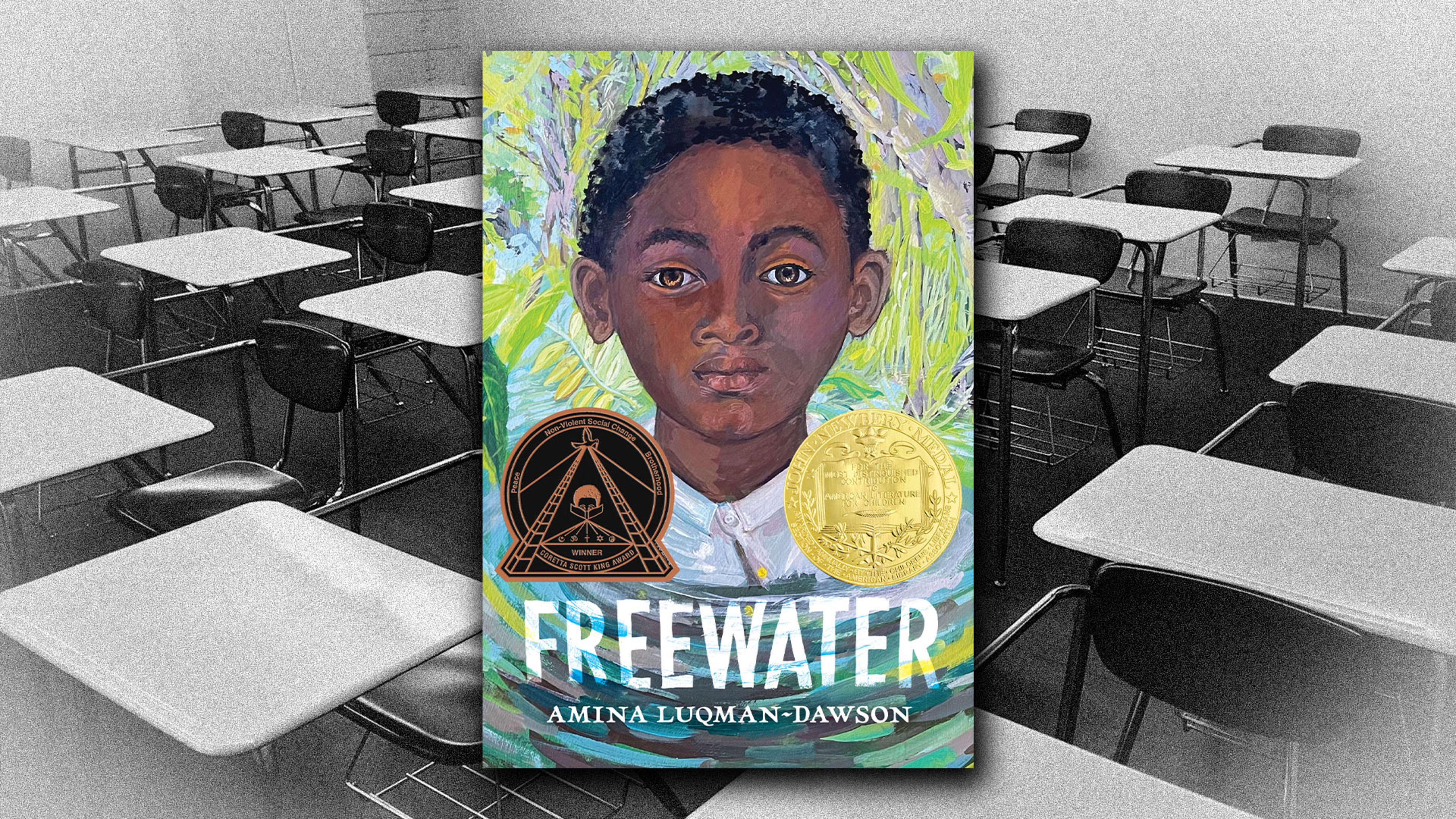First awarded in 1922, the John Newbery Medal is considered the most prestigious prize for young adult fiction, with a roster of past honorees that includes Neil Gaiman and Beverly Cleary. The Newbery generally leads to a major boost in visibility and demand for the winning book in bookstores, libraries, and school classrooms.

This year’s winner, Freewater, by Amina Luqman-Dawson, follows a pair of young siblings who escape slavery and stumble upon a secluded community of formerly enslaved people living in the wilderness. Blending historical fiction with a touch of fantasy, Freewater draws inspiration from the history of the Great Dismal Swamp that stretched from southern Virginia to northern North Carolina, which became a refuge for formerly enslaved people from the 1700s through the Civil War.
But the Newbery announcement on Monday came during a week of escalating developments around the country about what books count as permissible children’s and young adult literature under recent legislation in more than a handful of states, as well as Governor Ron DeSantis’s push to expand restrictions on how Black history is taught in Florida schools. Florida is one of at least 10 states that have passed laws limiting students’ access to books or expanding parental oversight of library collections, according to an analysis by The Washington Post. PEN America recorded 1,648 banned book titles between July 2021 to June 2022, a dramatic increase from previous years, and a movement the group calls “deeply undemocratic.” The ACLU called Florida’s latest legislation a threat to First Amendment rights.
As educators scramble to comprehend the new restrictions, Freewater, along with dozens of other titles, is likely to get caught in the crosshairs. “Do I think that Freewater will be added to certain counties’ banned or challenged books lists? Absolutely, I am certain of that,” says Kathleen Daniels, president of the Florida Association for Media in Education (FAME). “It’s so disheartening.”
This week, teachers in at least two Florida counties, Manatee and Duval, emptied their bookshelves or obscured them with construction paper, pending the review of their classroom libraries by a so-called specialist who has undergone a new training, released by the state’s department of education in January. The Florida law, known as House Bill 1467, mandates that approved books be pornography-free, age appropriate, and “suited to student needs and their ability to comprehend the material presented.” What exactly this means is chillingly vague. Books that include LGBTQ+ themes and those that depict Black characters and address racism have been among the most frequently challenged in the recent wave of bans, according to PEN.
The online training released by Florida’s department of education states that books taught in class must also comply with House Bill 7 (HB 7), or the Individual Freedom Act, passed last year, which bars students from being made to feel “guilt, anguish, or other forms of psychological distress” over the past actions of members of their race or sex—restrictions, Governor DeSantis revealed this week, he is pushing to expand to the college level. The guidance also suggests educators “err on the side of caution” when determining which books are suitable for students. Violations of the law could be considered a third-degree felony, punishable by up to five years in prison and a $5,000 fine.
“There’s nothing barring libraries from having books on slavery or racism, especially if they are not instructional materials,” Daniels says. “Freewater saying that slavery existed is not CRT,” or Critical Race Theory, a framework for considering the social construction of race and its consequences, which HB 7 was designed to prohibit. “But obviously, that is my opinion and would have to be held up in court,” Daniels says.
Regulations in Florida and other states, including Virginia and Pennsylvania, have also greatly expanded parents’ ability to raise objections and compel county officials to remove titles from schools. Last month, Florida’s Pinellas County pulled Toni Morrison’s The Bluest Eye from circulation after a parent objected to its “explicit descriptions of illegal activities,” including pedophilia, according to the Tampa Bay Times. That book is often included on the American Library Association’s list of the 100 most banned and challenged books, alongside Morrison’s Beloved and Harper Lee’s To Kill a Mockingbird, which are unflinching in their portrayals of racist violence.
Though the protagonists of Luqman-Dawson’s Freewater are running from enslavement on a southern plantation, the brutality of slavery is most often depicted indirectly, through scars or memories of what they have experienced. The novel is designed with young adults—and the importance of learning about a foundational era of American history—in mind.
“Slavery’s legacy has impacted almost every facet of American life,” Luqman-Dawson tells Fast Company over email. “If we seek to have future generations truly understand, and improve, the world we live in, they need a connection to this time period,” she says. And books like Freewater are well positioned to play a pivotal role in helping kids understand a difficult subject. “Literature can speak the language of children,” continues Luqman-Dawson; “it can embrace the good and the bad of history and everything in between. When kids speak about the country’s history of slavery, I want them to feel unencumbered by the fear of learning that we often encounter among adults today.”
And narrowing the perspectives that kids experience through books runs counter to the educational value of reading and its importance for personal development. “I don’t know of any research studies that say limiting books is a positive to anyone,” Daniels says. “But I’ve heard kids say firsthand that reading a book they’ve seen themselves reflected in has literally saved their life.”
Recognize your brand’s excellence by applying to this year’s Brands That Matter Awards before the early-rate deadline, May 3.
